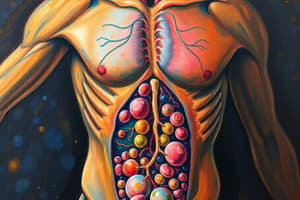Podcast
Questions and Answers
What is the primary function of protein in the human body?
What is the primary function of protein in the human body?
- To regulate body temperature
- To maintain a healthy weight
- To build and repair tissues (correct)
- To provide energy
What is the primary function of protein in the body?
What is the primary function of protein in the body?
- Providing energy
- Producing vitamins and minerals
- Maintaining healthy skin and hair
- Building and repairing tissues (correct)
Which of the following is NOT a nutrient found in fruits and vegetables?
Which of the following is NOT a nutrient found in fruits and vegetables?
- Vitamins
- Protein (correct)
- Fiber
- Minerals
Which food group is a good source of energy?
Which food group is a good source of energy?
What is the recommended daily intake of fruits and vegetables?
What is the recommended daily intake of fruits and vegetables?
What is the main function of carbohydrates in the body?
What is the main function of carbohydrates in the body?
Which of the following is a characteristic of healthy fats?
Which of the following is a characteristic of healthy fats?
Why is it recommended to opt for low-fat or fat-free dairy products?
Why is it recommended to opt for low-fat or fat-free dairy products?
What is the recommended daily intake of protein?
What is the recommended daily intake of protein?
Which of the following is an example of a grain?
Which of the following is an example of a grain?
What is the primary function of water in the body?
What is the primary function of water in the body?
Which of the following is a type of micronutrient?
Which of the following is a type of micronutrient?
Flashcards are hidden until you start studying
Study Notes
Human Body and Food: Understanding Food Groups and Nutrients
Food provides essential nutrients that our bodies need to function optimally. Understanding the different food groups and the nutrients they provide is crucial for maintaining a balanced and healthy diet. Here, we will explore the various food groups and their associated nutrients.
Food Groups
1. Fruits and Vegetables
Fruits and vegetables are an important part of a healthy diet. They are packed with essential vitamins, minerals, and fiber, which are crucial for maintaining overall health. These foods are low in fat and calories, making them ideal for those looking to maintain a healthy weight. The recommended daily intake for fruits and vegetables is at least five portions per day.
2. Grains
Grains, particularly whole grains, should make up around a third of our daily food intake. They are a good source of energy and essential nutrients such as fiber, calcium, iron, and vitamins. Some examples of grains include bread, rice, pasta, and cereals.
3. Protein Foods
Protein is essential for building and repairing tissues in the body. It can be found in a variety of foods, including lean meats, poultry, seafood, eggs, beans, nuts, and seeds. The recommended daily intake of protein varies, but it is generally suggested that we consume around 4-6 ounces per day.
4. Dairy
Dairy products, such as milk, cheese, and yogurt, are important sources of calcium, potassium, and vitamin D, which are essential for maintaining strong bones. Opt for low-fat or fat-free dairy options to lower the risk of heart disease.
5. Fat
While not a food group in the traditional sense, fats are an essential component of a healthy diet. They provide energy and help the body absorb certain vitamins. Choose unsaturated fats, such as those found in olive oil, avocados, and nuts, over saturated fats found in processed foods.
Nutrients
1. Macronutrients
- Protein: Protein is essential for building and repairing tissues in the body, as well as providing energy.
- Carbohydrates: Carbohydrates provide energy and are an essential source of fuel for the body.
- Fat: Fats provide energy and help the body absorb certain vitamins. They are also important for maintaining healthy skin, hair, and bones.
2. Micronutrients
- Vitamins: Vitamins are essential for various bodily functions, such as energy production, immune function, and wound healing.
- Minerals: Minerals, such as calcium and iron, are essential for maintaining strong bones and healthy blood, respectively.
3. Water
Water is essential for maintaining proper hydration, which is crucial for overall health and well-being.
In conclusion, understanding the various food groups and their associated nutrients is vital for maintaining a balanced and healthy diet. By incorporating a variety of fruits, vegetables, grains, protein foods, dairy products, and healthy fats, along with adequate hydration, we can ensure our bodies receive the essential nutrients they need to function optimally.
Studying That Suits You
Use AI to generate personalized quizzes and flashcards to suit your learning preferences.



